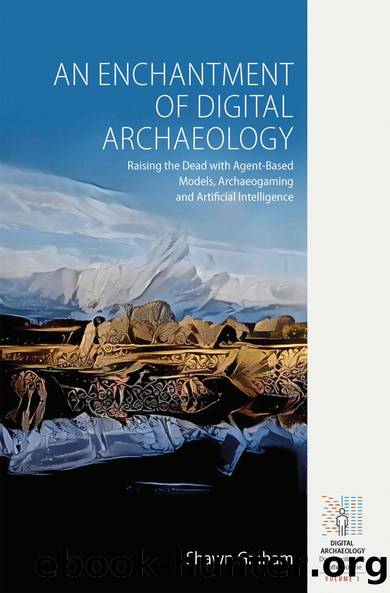An Enchantment of Digital Archaeology by Shawn Graham

Author:Shawn Graham [Graham, Shawn]
Language: eng
Format: epub
Tags: Social Science, Archaeology, Anthropology, General
ISBN: 9781789207873
Google: c6PLDwAAQBAJ
Publisher: Berghahn Books
Published: 2020-07-01T05:23:01+00:00
SimCity, Roman City
If there is a game designer who might understand what enchantment via the digital means, itâs Will Wright. In an interview in 2005, Wright discussed how he came to design SimCity and some of its various spinoffs (Phipps 2005). He mentions how he was inspired by how kids are entranced by ants and the kind of spontaneous self-organization that ant colonies exhibit, calling it âalmost magicalâ: âI began wondering, could we build a more robust simulation of human behavior if we adopted this ant model, where we distribute the intelligence not through the agents, but through the environment?â (in Phipps 2005). This idea led him towards a model where the player creates the environment, experimenting with different configurations, and the agents respond accordingly. The blanks-in-the-story that this creates naturally are filled by the playerâs imagination, making the player and the computer co-creators, each playing to their own cognitive strengths.
Something almost magical. Something fascinating when we experiment. Distributed intelligence. Spaces that react to the assemblages put within them. Coproducing meaning by letting the computer and the person tell the story through the gaps. All of this tells us that SimCity is a vector for a digital enchantment that can change the way we see the world.
SimCity has had an extraordinary amount of influence in the game design space, arguably creating the entire management-sim genre. Rollinger (2015: 4-5) calls the kind of history encountered in a game space a kind of âaffective historyâ and thus a source of a potentially different kind of historical knowledge, and considers what kind of affective history the playing of the Caesar franchise of games permit. In all of the Caesar games, the core mechanic is the same: it is a city-builder set in a vaguely âRomanâ time and place. You as the governor have to lay down where every workshop, insula, bathhouse, shop and so on will be. In this way, you attract colonists, who go about their lives. It is explicitly colonial: previous inhabitants of the area turn up from time to time as barbarians at the gates. The inhabitants of your city pay taxes; you use the taxes to build more of the city. Every building requires different âclassesâ of people to perform different roles; you must balance their needs and desires to keep them happy citizens who do not quit your city in disgust (or die, as sometimes happens). Rollinger considers carefully where this representation of âthe Roman cityâ falls on the spectrum of plausibility. Some mistakes can be forgiven for the purposes of playability; but a deeper issue that Rollinger identifies is that the kind of city that is depicted here is not an ancient one, but a city of the late twentieth century United States. As a clone of SimCity, how could it be otherwise?
Will Wright famously invented SimCity as a result of finding the terrain editor tool he was working with to build a shooter game, Raid on Bungling Bay, more compelling than the game itself. To make
Download
This site does not store any files on its server. We only index and link to content provided by other sites. Please contact the content providers to delete copyright contents if any and email us, we'll remove relevant links or contents immediately.
Born to Run: by Christopher McDougall(7120)
The Leavers by Lisa Ko(6945)
iGen by Jean M. Twenge(5408)
Sapiens by Yuval Noah Harari(5365)
Spare by Prince Harry The Duke of Sussex(5176)
The Kite Runner by Khaled Hosseini(5168)
Machine Learning at Scale with H2O by Gregory Keys | David Whiting(4292)
Bullshit Jobs by David Graeber(4179)
Never by Ken Follett(3937)
Goodbye Paradise(3798)
Livewired by David Eagleman(3764)
Fairy Tale by Stephen King(3370)
A Dictionary of Sociology by Unknown(3073)
Harry Potter 4 - Harry Potter and The Goblet of Fire by J.K.Rowling(3060)
The Social Psychology of Inequality by Unknown(3018)
The Club by A.L. Brooks(2919)
Will by Will Smith(2908)
0041152001443424520 .pdf by Unknown(2843)
People of the Earth: An Introduction to World Prehistory by Dr. Brian Fagan & Nadia Durrani(2727)
